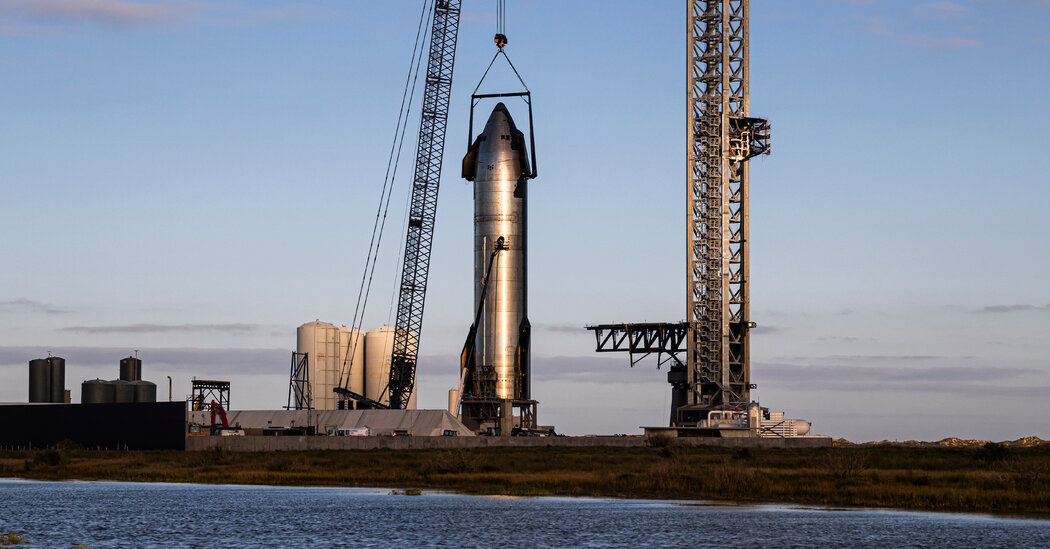Paywalled, but link is a gift article from me
Wiping out wildlife is a small price to pay so that one day we might be able to rocket to barren, lifeless worlds that are totally uninhabitable.
So hard to tell if this is sarcastic.
Well done!
You get the snark award of the day.

Some day this world will be barren and lifeless and totally uninhabitable. I’m not defending Space X, but sooner or later we’ll need to leave. I wouldn’t be quite that dismissive of the need to get out there, but that’s not as urgent as the environment.
Some day this world will be barren and lifeless and totally uninhabitable.
“Some day” is likely to be several hundred million years, if not a billion years from now. That is hundreds and hundreds of times longer than our species has existed. To say that’s not as urgent as the environment is a pretty significant understatement. In fact, I’d say that threat is about as far from urgent as one could imagine.
There’s a mass extension event every 100 million years.
The last mass extinction (excluding the current, ongoing mass extinction) that occurred approximately 66 million years ago, resulted in the extinction of three quarters of all plant and animal species and wiped out all non-avian dinosaurs, and yet the Earth then was still more hospitable to life than any other planet we know of.
mass extinction event ≠ barren and lifeless. We have a mass extinction event going on Right now because of human impact, the anthropocene.
That’s a best case scenario. A gamma ray burst could hit the planet tomorrow and we’re all gone. A madman with a bunch of nukes could trigger a nuclear winter. A massive volcano could darken the skies for years - wouldn’t be the first time. I’d like to see some progress just in case.
When you’re Elon Musk, wiping out wildlife isn’t a price to pay, it’s a spectator sport.
He’s not a big game hunter because you can’t kill enough animals at one time that way.
While I see the sarcasm, that statement is really pretty accurate. I mean, this rocket is probably the most important thing humans are doing right now. I can’t think of a higher priority project.
I can’t think of a higher priority project.
I can’t think of how it would be a priority at all.
A reusable rocket? It represents entering a new phase of humanity.
It’s a much more significant leap into space than the moon landing, because it greatly improves our access to space. If this thing works, if we end up with a working reusable rocket, it doesn’t just mean more satellites, or more astronauts, it means you and I can start going to space in our lifetime. It means people will start having jobs in space. It means we can finally start reaching out in a real way.
It means we can finally start reaching out in a real way.
I personally don’t consider that to be a priority.
Well I don’t know what to tell you. Feel free to dream bigger?
I’m not necessarily opposed to having grand, long term ambitions, but I just don’t see how something like that could be considered a priority. When I think of a priority, I think of some immediate need. I don’t see space exploration as a necessity. Again, I’m not against it, necessarily, but I think preserving this planet’s biosphere should absolutely be considered the priority. After all, the Earth is the only human supporting habitat known to exist in the universe.
Again, I’m not against it, necessarily, but I think preserving this planet’s biosphere should absolutely be considered the priority. After all, the Earth is the only human supporting habitat known to exist in the universe.
I agree completely. But I’m also of the opinion that living in space is how we’ll develop those technologies we need to survive on earth, maybe it’s the only way.
The problem is that while we could develop those technologies on earth, we aren’t, not fast enough. But living in space would force us to develop those technologies, and that’s what we need. Solar power is a great example, photovoltaics were a very niche form of power generation, hardly utilized at all. But it was necessary in spacecrafts, it was the only thing that made sense (well, sometimes nuclear made sense too, but not my point). As a result, a lot of solar research and development was done by NASA and other contractors for the space program, and now we have panels in our roofs today. But that’s just the tip of the iceberg, and here’s why: bringing things to space is expensive, so it’s better to reuse, recycle, repurpose and repair whenever possible. Long term facilities in space will naturally want to reduce costs to a minimum whenever possible, and that means learning how to operate in a way that reuses and repurposes waste, rather than discarding it. All the CO2 generated, that can be reprocessed into useful carbon and vital oxygen. But it won’t stop there, we’ll want to repurpose every bit of waste we possibly can, creating totally closed-loop environments, the absolute pinnacle of sustainability.
And of course one of the great things about a closed loop environment is that it doesn’t pollute, it hardly effects the environment around it at all. And even with reusable rockets, anything we can build in space, will still be cheaper to build here on earth. And once we know how to live in a closed loop because space forced us to, we’ll have everything we need to do it here on earth because we want to.
Also we’ll be able to travel the solar system, so that’s super cool. Space is cool.
Let me let you in on a little secret, because the title implies otherwise - wildlife protection was never a priority, and will never become one, to any company under capitalism, but especially to a company like that.
With the Chevron case, we likely won’t see any additional protections coming either.
And I’m sure that isn’t the only case either…
There is always this framing that we are now getting fucked over… Which is disingenuous since peasants are always getting fucked over.
There’s currently a hurricane incoming from the Gulf of Mexico, it’ll be interesting to compare the damage it causes to the damage that would have been caused by a regular rocket launch.
Ultimately, these rocket operations need to be done somewhere. Due to their nature that “somewhere” has a lot of restrictions on it. It needs to be as far south as practical (to benefit from Earth’s rotation), it needs to be somewhere far from human habitation for safety and sonic reasons, and the path to the west needs to be clear of stuff that could be damaged by falling debris. For political reasons it needs to be in the United States. All these competing criteria generally mean it’s going to have to be on a southern coastline where there’s currently wilderness.
It would be relevant compare SpaceX’s environmental damage to that of any other big company.
Given the tons of CO2 they emit I’m guessing a lot!
Yeah, but actual numbers would be nice.









